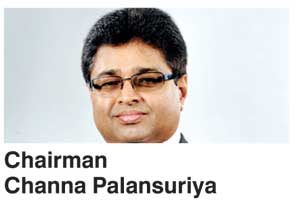Monday Feb 23, 2026
Monday Feb 23, 2026
Monday, 8 May 2017 01:26 - - {{hitsCtrl.values.hits}}
Starting 2017 on a positive note, Sampath Bank has surpassed the Rs. 2 billion mark to achieve a post-tax profit of Rs. 2.3 billion for the quarter ended 31 March 2017.
This registered an impressive 34.6% growth in comparison to the profit after tax (PAT) of Rs. 1.7 billion recorded for 1Q 2016. Profit before tax (PBT) too grew by 36.4% YoY and reached Rs. 3.5 billion in 1Q 2017. The Sampath Group, which comprises Sampath Bank and four fully-owned subsidiary companies, has also posted a growth of 33.3% and 29.5% at the PBT and PAT levels respectively.
 The bank achieved substantial growth in all key business pillars in the first quarter of 2017.
The bank achieved substantial growth in all key business pillars in the first quarter of 2017.
Net Interest Income (NII), which is the main source of income, representing more than 70% of the total operating income of the bank, recorded an increase of Rs. 1.7 billion (36.1%) during the period under review. Accordingly, the bank recorded Rs. 6.3 billion as NII for 1Q 2017, as against Rs. 4.7 billion recorded in the corresponding period of 2016.
This achievement was made possible by the robust growth recorded in the bank’s fund base, as indicated by the 4.4% (annualised 18%) growth in deposits and 6.5% (annualised 26%) growth in advances, coupled with the timely re-pricing of asset and liability products and other fund management strategies adopted by the bank.
Net fee and commission income, which largely comprises credit, trade, card and electronic channel-related fees, increased to Rs. 1.9 billion in the quarter under review, as opposed to Rs. 1.5 billion recorded in the corresponding period of 2016.
This important income source too has posted a notable YoY growth of 32.5%, leveraging on the credit and trade-related segments, expansion of the credit card operations and the successful launch of innovative value additions through electronic channel offerings.
The bank’s other operating income recorded a marginal increase of 7.1% during the period under review, in comparison to the corresponding period. The increase in dividend income from subsidiaries and the increase in realised exchange income have contributed to the increase in this income source. Consequently, Other Operating Income for 1Q 2017 stood at Rs. 776.2 million, as opposed to Rs. 724.9 million reported for 1Q 2016.
The operating expenses of the bank, which stood at Rs. 3.4 billion in 1Q 2016, increased to Rs. 4.0 billion during the period under review, reflecting a YoY increase of 15.9%. This increase was mainly due to an increase in personnel expenses triggered by salary  increments and other relevant expenses, as well as general price hikes and tax increases, etc.
increments and other relevant expenses, as well as general price hikes and tax increases, etc.
However, the Cost to Income ratio excluding VAT and NBT on financial services has improved to 43.7% in the first quarter of the year from the 50.8% reported in the same period of 2016. This records an improvement of 710 basis points, which is a significant achievement particularly in view of Sampath Bank having one of the youngest branch networks compared to its closest competitors.
Impairment charge amounting to Rs. 646.1 million recorded for 1Q 2017 showed an increase of Rs. 429.6 million over the comparative period’s charge of Rs. 216.5 million. Impairment charge against individually significant customers increased by Rs. 384.9 million due to provision increases made against already impaired customers after considering the latest market conditions. On the other hand, the collective impairment charge increased by Rs. 44.7 million, predominantly due to the growth in the loan portfolio.
Sampath Bank’s total asset base grew by 5.1% (annualised 20%) in 1Q 2017 to reach Rs. 692.1 billion as at 31 March 2017. The total asset position as at 31 December 2016 stood at Rs. 658.5 billion.
Gross loans and receivables grew by 6.5% (annualised 26%) during the period and moved up to Rs. 498.9 billion (up by Rs. 30.4 billion) as at 31 March 2017.
The total deposit base too increased by Rs. 22.9 billion, recording a growth of 4.4% (annualised 18%) during this period and stood at Rs. 539.2 billion as at the reporting date. The CASA ratio (38.4%) remained unchanged from 31 December 2016 to 31 March 2017.
ROE (after tax) declined from 23.47% as at 31 December 2016 to 20.72% as at 31 March 2017. ROA (before tax) too has marginally contracted to 2.10% from 2.14% in the same period. However, compared to 31 March 2016, both ROE and ROA have shown increases as at 31 March 2017.
The Basic Earnings per share for 1Q 2017 has substantially improved and stood at Rs. 12.57 as against Rs. 9.34 recorded during the corresponding period of the previous year. This was an impressive YoY growth of 34.6%.
Statutory Liquid Asset Ratio (SLAR) as at 31 March 2017 was at 21.94%, showing a marginal improvement against the ratio recorded as at 31 December 2016 (21.84%). The bank was able to maintain SLAR well above the mandatory requirement of 20% throughout the period. Sampath Bank’s gross NPL ratio as at 31 March 2017 (1.73%), however, has marginally increased from the 1.61% recorded as at 31 December 2016 due to marginal deterioration of credit quality.
The Core Capital (Tier I) and Total Capital (Tier I + Tier II) adequacy ratios, which stood at 8.31% and 12.87% respectively as at 31 December 2016, have shown a drop during the period as a result of an increase in risk weighted assets triggered by growth in advance portfolio coupled with payment of cash dividend.
Accordingly, Core Capital and Total Capital adequacy ratios as at 31 March 2017 stood at 7.68% and 11.93% respectively. Despite the slight drop, both ratios were maintained well above the minimum regulatory requirement of 5% for Core Capital and 10% for Total Capital.
2017 is an important year for Sampath Bank, where the bank celebrates its 30th anniversary. Since its establishment in 1987, the bank has progressively developed in all spheres of its operation and today it is positioned as the third-largest private sector commercial bank in Sri Lanka. The bank is renowned for its innovative banking solutions and excellent customer service during the past three decades.